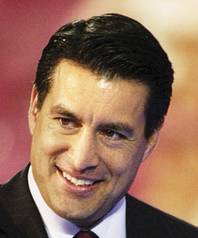Thursday, Feb. 3, 2011 | 2:01 a.m.

Brian Sandoval
Sun Coverage
Sun archives
- Chancellor: University tuition would have to go up 73 percent to cover Sandoval budget gap (1-27-2011)
- School officials warn of jobs cuts, larger classes under proposed budget (1-26-2011)
- A steep climb for Nevadans (1-26-2011)
- Soft words during State of the State hide Nevada in pain (1-25-2011)
- Teachers not pleased with most of Sandoval’s speech (1-25-2011)
- In response, Democrats say taxes might be part of budget solution (1-24-2011)
Michelle Rhee, former chancellor of Washington, D.C., schools, attended last month’s State of the State address at the invitation of Gov. Brian Sandoval.
Although her role in Nevada is as yet undefined, Sandoval said she would be a “voice for students” in the state’s education debate.
Rhee, a registered Democrat who has had a confrontational relationship with teachers unions, is a national figure courted by potential 2012 GOP presidential challengers and reform-oriented governors.
She is also working to raise $200 million to push for national education reforms through her organization StudentsFirst.
(She left her position in Washington after the mayor she served under lost.)
The 2011 Nevada Legislature starts Monday. And lawmakers will consider a variety of changes in education. They will also consider a proposal by Sandoval to cut K-12 by 9 percent. Sandoval said education can be improved even with the cut.
The Sun spoke with Rhee by phone Wednesday. The interview was edited for clarity and space.
By many measures, Nevada’s K-12 system has struggled. Have you identified any problems with it?
Nevada is one of the states that has been falling further and further behind over last few years. I think if you look at most of the states that are facing similar statistics, there’s never one thing you can pinpoint as the reason why things are not going well.
Over the past five years, 95 percent of Clark County teachers got tenure after one year. Is that surprising?
Most states have it structured so teachers get tenure after two or three years. But it’s sort of meaningless anyway because everyone gets tenure. If you give it to everyone, it doesn’t make a difference when you draw that line.
Do you support eliminating teacher tenure altogether?
There’s no correlation between tenure and student achievement. We don’t think there’s a need for tenure. There are federal protections from discrimination in place now that afford teachers and all employees those recourses.
Tenure has turned into something where it’s almost impossible, or costly and time consuming, to remove a teacher.
How would you evaluate teachers?
Fifty percent of a teacher’s evaluation should be students’ value-added growth (a measure of a student’s year-over-year improvement on tests). The rest should be classroom observation; student evaluations of teachers; looking at schoolwide gains, so there’s a team component; and then things above and beyond, like reaching out effectively to parents or coaching soccer.
Washington schools had some of the highest per-pupil funding in the nation. Nevada has some of the lowest. Is there a correlation between money and success?
When I came in, it was one of the lowest performing school districts in the country. It was proof that money is not correlated to outcomes.
Nationally, over the last 30 years we have more than doubled the amount of money we’re spending per student on education and the results have only gotten worse.
Is there a point where you don’t have enough money to function well, even if you make all the right reforms?
I don’t necessarily think anyone is at that point. Let me give you an example: We’re spending billions of dollars nationally for master’s degrees in education for teachers. There’s no correlation between having a master’s degree in education and student gains. So why would we pour money down there?

Join the Discussion:
Check this out for a full explanation of our conversion to the LiveFyre commenting system and instructions on how to sign up for an account.
Full comments policy